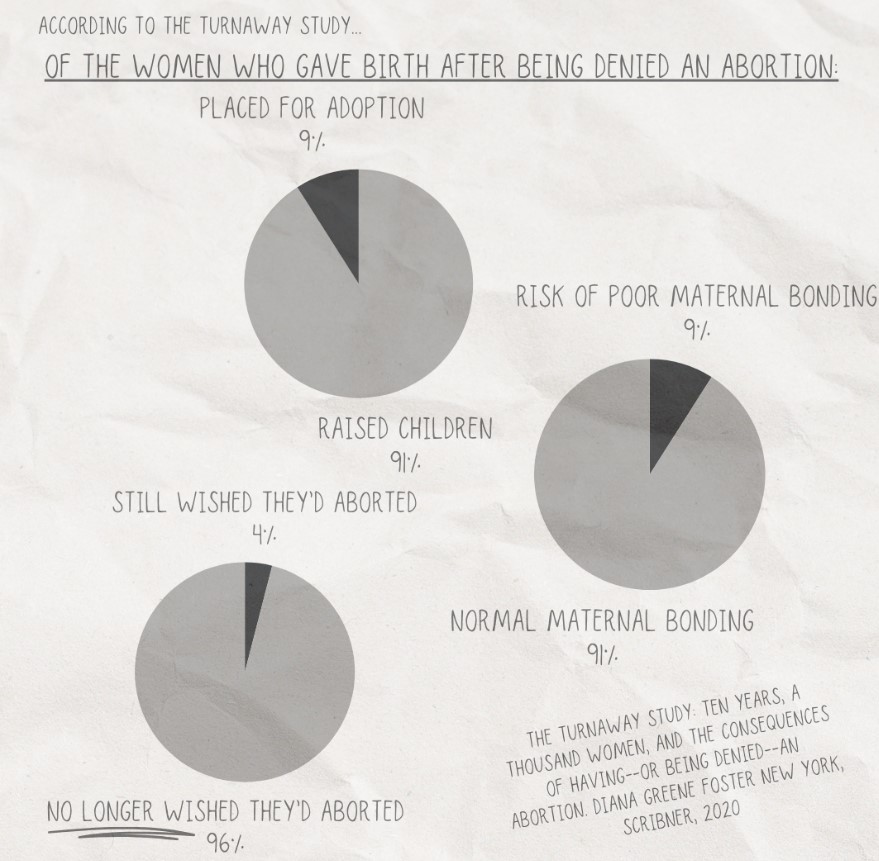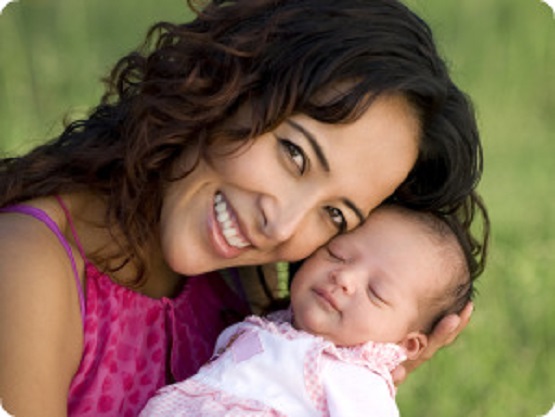(Any time we discuss women who don’t regret being denied abortion, people think we are claiming their perspectives are a reason to ban abortion. In fact, there are multiple reasons to take notice of these women’s experiences, regardless of your views on abortion laws.)
Some people believe if a woman gives birth only because she couldn’t get an abortion, she’s likely to be an incompetent, neglectful, or abusive mother.
We see versions of this idea from pro-choicers, for example when they assume abortion restrictions will mean “millions of unwanted children” go into the foster care system:
We’ve seen versions of this idea from pro-lifers, for example in abortion regulations from the 1970s that intended to automatically terminate parental rights for any infant born alive after an attempted abortion (this provision was found unconstitutional).
Those who care about women, children, and families should actively disavow the idea that women who can’t abort will not love or care for their children. It’s a myth.
Follow LifeNews on the MeWe social media network for the latest pro-life news free from Facebook’s censorship!
The Turnaway Study found that of women who give birth after being denied abortion, 91% raise their children themselves (9% place for adoption). Of those who raise their children themselves, 91% emotionally bond to their babies normally, and 98% say they no longer wish they’d gotten an abortion.
Let’s examine these statistics one at a time.
1. 91% of women who give birth after abortion denial raise their children themselves.
This statistic comes from “Adoption Decision Making among Women Seeking Abortion,” published in Women’s Health Issues in April 2017.
A minority of women denied abortions (n = 231; 14%) were considering adoption at 1 week after denial. Of participants who gave birth (n = 161), most (91%) chose parenting.
Adoption Decision Making among Women Seeking Abortion, Sisson et al, April 2017
Abortion restrictions and bans can prevent women from aborting, but they can’t force people to parent. People can choose to go through the adoption process or, in even more desperate situations, can place their babies in Safe Haven boxes.
But few want to do this. Adoption is an alternative to parenting, not to abortion. And absent the option of abortion, most women would rather parent than place for adoption.
Note, also, that those who do choose to place for adoption nearly always do so because they believe it will serve the child’s best interests. It’s an act of love for their child, again not indicative of poor parenting.
2. 91% emotionally bond to their babies normally.
This statistic comes from “Comparison of Health, Development, Maternal Bonding, and Poverty Among Children Born After Denial of Abortion vs After Pregnancies Subsequent to an Abortion” published in JAMA Pediatrics in September 2018.
The paper compares two groups of women and their children: (1) the children women birthed after being denied abortion (called “index children”) and (2) the children women birthed after getting abortions and going on to birth other children later (called “subsequent children”).
The study used the Postpartum Bonding Questionnaire to measure how mothers were emotionally bonding to their children age 18 months or younger; a score of 12 or higher on the Questionnaire indicates a risk of poor maternal bonding. The study found that 3% of mothers of subsequent children and 9% of mothers of index children were at risk of poor maternal bonding.
In other words, 97% of mothers of subsequent children and 91% of mothers of index children emotionally bonded to their babies normally.
Note that this measurement was taken when children were age 18 months or younger. Other research from the Turnaway Study found that, as time went on, an increasing proportion of mothers said they no longer wished they’d aborted. The greatest changes happened while the women were still pregnant, but even from birth to the child’s first birthday, and from the child’s first birthday to several years later, more and more mothers said they no longer wished they’d aborted.
It’s plausible that this ongoing retroactive acceptance of their abortion denial would correlate with ongoing improved emotional bonding with the child from age 18 months through the toddler years.
Similarly, and unsurprisingly, women were more likely to retroactively view their abortion denial in a positive light if they had better social support. No doubt as we improve social support for vulnerable pregnant women, we further decrease the percentage of women who are at risk of poor emotional bonding to their babies.
3. 98% say they no longer wish they’d aborted.
The Turnaway Study found that the overwhelming majority (96%) of women who gave birth after being denied an abortion ultimately said they no longer wished they’d aborted.
Notably, women who raised their children themselves were less likely to say they still wished they’d aborted compared to women who placed for adoption: only 77% of women who placed their babies for adoption said they no longer wished they’d aborted, compared to 98% of women who raised their children themselves. This also means that women who placed for adoption made up only 9% of the women who gave birth after abortion denial, but a whopping 57% of women who continued to say “yes” or “don’t know” when asked if they still wished they’d aborted.
These statistics come from “Emotions over five years after denial of abortion in the United States: Contextualizing the effects of abortion denial on women’s health and lives” published in Social Science & Medicine in 2021. It’s a quantitative analysis alongside excerpts from qualitative interviews.
The interviews revealed women who “felt their child motivated them to have a better life or career or to avoid drugs and alcohol.” The authors talk about a woman who cut off ties with family members who had tried to push her to abort, and a woman who couldn’t believe she considered abortion in the first place.
I bring down tears something when I see him, I’m like, oh my God, how could it pass my head to have an abortion, and now I have a lovely son, you know, that I adore so much, that I love so much, you know? (Julia, 26, Midwest)
Emotions over five years after denial of abortion in the United States: Contextualizing the effects of abortion denial on women’s health and lives, Rocca et al, January 2021
I will say again: women were more likely to no longer wish they had aborted—and more likely to have decreases in negative emotions and increases in positive emotions—when they had more social support. Here “social support” means not only practical, logistical help, but also meaningful relationships and emotional support. Researchers determined which women had social support based on how much they agreed with statements such as “I can talk about my problems with my friends” or “My family really tries to help me.” Moms and babies are happier and healthier when they have their village around them.
Overall, the article finds women increasingly viewed their abortion denials positively “in parallel with growing bonds with the baby and, for some, a new sense of purpose in life gained from the challenge of the responsibility of a child.”

Note: 96% of all women who gave birth (both those who raised their children and those who placed for adoption) no longer wished they’d aborted, compared to 98% of specifically the women who gave birth and raised their children.
So what kind of mothers do we expect women denied abortion to be? The kind who love their children.
LifeNews.com Note: Monica Snyder is the executive director of Secular Pro-Life, an organization that uses non-religious arguments to promote the pro-life perspective. Snyder worked as an investigator with the human rights organization, Live Action, to investigate the Washington-Surgi Abortion Clinic to expose their late-term abortion practices. She also serves as the Executive Director of Secular Pro-Life.








